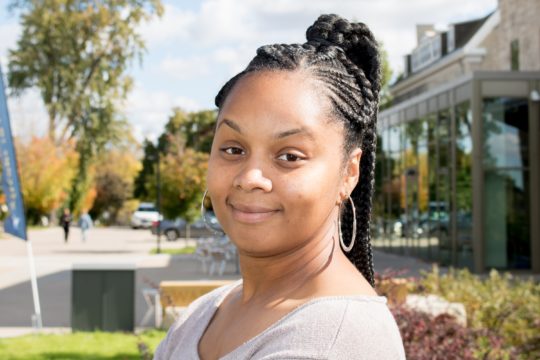
Dr. Brittany Bell.
Photo by Sarah Navy.
The assumption that there is a universal and singular experience as a womxn erases the nuances and variety that exist. This column seeks to address the many intersections that may overlap in an individual’s life. All this is done in an effort to celebrate the reality of womxnhood in the various ways it may be expressed.
Dr. Brittany Bell, the Assistant Dean of Students and Director of the Diversity and Intercultural Center, describes herself foremost as humble. Outside of campus, some do not even know what her profession and education are because she doesn’t make a habit of announcing it. When they do find out, they express genuine surprise. She could speculate the reasons why — age mostly, but microagressions do occur — but she shrugs off the disrespect instead. She chooses to remain dedicated and focused on the things that matter in the long run.
Bell hesitates to disparage where she grew up, but the smallness and segregated organization of the city did limit her when living there. She describes growing up as being in a bubble, unaware of the opportunities that existed beyond her physical location and settled into circumstances there. It wasn’t until she stepped foot on a campus that she was overwhelmed by the options in front of her. Bell once envisioned herself as an entrepreneur, but upon entering college, she discovered an interest in communications. Learning the craft dominated much of her college time, but she made it a point to get involved in student affairs.
Still, the culture at her campus made Bell more reserved than she had ever been. She had graduated from a school system where her peers resembled her and were familiar. Matriculating to a predominately white institution was a challenge for her because of the unfamiliarity. The transition of circumstances coupled with feeling physically and internally different caused her to become reserved and quiet.
Despite being guarded, Bell shined through her work in student affairs. It was there that a mentor had taken her aside and told her she saw a potential profession for her. A major existed for her to develop her skillset, but she had to make a decision: it was either continue her track in communications, or start anew in student affairs in the middle of her junior year. The choice was debilitating at the time. It seemed like she would be undoing all the work she had put in the last three years.
In retrospect, however, the choice seems simple. “I felt like I could give back to students, especially considering my experience on [that] campus,” Bell said. “I knew what it was like stepping into spaces and thinking, ‘This is different.’”
Eventually, Bell obtained her doctorate and worked on a range of different campuses. As Bell broke into her career, the roles she fulfilled often coincided with the achievement of being the “first” of her background to do so. She doesn’t make much of this — she considers it more of a reflection of the changing social tide than any sort of personal achievement. Individuals with diverse backgrounds were breaking through alongside her, making up for the historical absence of womxn and people of color in these positions. The honor that goes with that amounts to little if the individual isn’t conscious of their responsibility to the students and the position. “Everyone has their own responsibility for how they can enact change,” Bell explained. “I personally focus on my own leadership abilities to create it. I can say all day long that there’s a million things institutions need to do, but there also needs to be an individual effort to create an inclusive environment.”
The effort required to do so isn’t difficult for Bell to produce. She eagerly approaches her work with the goal of creating a legacy. Conversations with students offer learning moments for her, but more importantly are opportunities to connect. Every working experience she has had has helped her grow professionally and personally. In turn, she uses that growth to help students however she can. She recognizes that her relatability is particularly helpful in those interactions, but she also tries to encourage students to consider different perspectives and opportunities that may exist around them.
Outside of campus, Bell focuses on her work with shelters in the area. Her volunteer experience has opened her eyes to the immensity of homelessness and the help needed to remedy the issue. “Oftentimes, people assume that homeless people are a certain demographic,” she said. “But, it happens all over the place to all people. There are too many people out there who need support.” She continued, “People just aren’t helping. Sometimes, I feel like help only occurs during holidays, but that’s not consistent.”
Despite the progress still needed, Bell continues to find inspiration in the act of helping others. It is an inspiration she tries to find in all aspects of her life.
